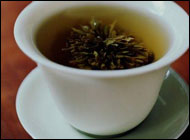Long-term tea drinking may cut stroke risk
There could be good news brewing for tea drinkers: Drinking tea consistently - particularly two kinds - is linked to a significantly lower risk of stroke, according to a study of people in southern China.
In a study of the tea drinking habits of 838 Chinese men and women, Dr. Andy H. Lee, of Curtin University of Technology in Perth, Australia, and colleagues found that those who reported drinking at least one cup of tea per week for more than 30 years had a 60 percent lower risk of ischemic stroke.
Ischemic stroke occurs when oxygen-delivering arteries in the brain become partially or completely blocked. It’s unclear why tea would protect against stroke, but the authors of the study note that previous research has suggested that tea or its components might reduce high blood pressure and other risk factors.
Those who drank more than 2 cups of tea daily had about a 40 percent lower risk of such strokes, and the risks were even lower in those who drank 2 cups daily of particular teas: Their study in the journal Stroke links drinking green and oolong teas with 72 and 79 percent lower risk for ischemic stroke, respectively.
“Tea is a safe and healthy beverage,” Lee told Reuters Health. To obtain optimal benefits, “long-term tea drinking should be encouraged,” he said.
The people in the study had an average age of 69 years. Of these, 374 had a medically confirmed ischemic stroke, and 464 (the “control” group) had no history of cardiovascular disease or medical conditions that placed them at increased stroke risk.
 As expected, the stroke group had higher rate of high blood pressure, diabetes, and smoking. By contrast, the control group reported higher fruit and vegetable intake and a longer duration of tea drinking.
As expected, the stroke group had higher rate of high blood pressure, diabetes, and smoking. By contrast, the control group reported higher fruit and vegetable intake and a longer duration of tea drinking.
The researchers also took into account gender, body mass, level of education, lifelong physical activity, smoking and alcohol intake, the presence of high blood pressure, cholesterol level, diabetes, and weekly dietary intake.
There also seemed to be a benefit to using more tea leaves: Lee’s team also saw 73 percent reduced risk associated with a “larger quantity of tea leaves used in tea brewing,” Lee said.
Though these findings are consistent with previous research from Japan, Lee and colleagues suggest further investigations among populations in other countries, plus studies to “ascertain whether tea consumption can enhance survival of stroke patients,” Lee said.
SOURCE: Stroke, July 2009